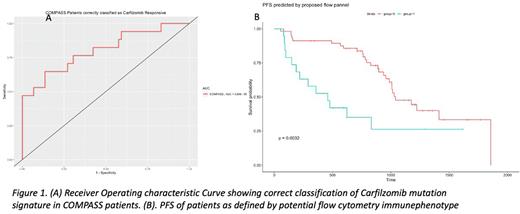Abstract
Introduction: Multiple myeloma remains an incurable disease with a significant variation in therapeutic response. Choice of treatment is largely determined by prior lines of therapy and the patient's fitness. However, myeloma is a highly heterogeneous disease and this approach risks failing to deliver the right drug at the right time to an individual patient. To begin to address this, we have adopted machine learning approaches to predict individual responses to specific anti-myeloma therapies. We have previously shown that it is possible to select rationally between bortezomib- and lenalidomide-based therapy using a gene expression signature. Gene expression models are difficult to implement clinically, so more recently we presented a five gene mutational signature to identify carfilzomib-specific responses. Although easier to translate, such molecular signatures can still be hindered clinically by slow processing and technical failures. Because flow cytometry is well established in the diagnostic laboratory and is sensitive enough to detect minimal residual disease, we set out to develop an immunophenotypic signature of carfilzomib-specific responsiveness in primary myeloma.
Methods We originally developed our mutational signature on whole exome sequencing of diagnostic samples from the CARDAMON clinical trial. For the current study, we performed RNA sequencing on 80 of these. Patients were divided into carfilzomib-responsive and non-responsive groups according to their mutational signature. Genes were filtered for those encoding cell surface proteins. A second round of filtering selected only those genes whose RNA expression correlated well with protein expression as determined by plasma membrane fractionation and mass spectrometry. Genes differentially expressed between the two groups were then detected using DeSEQ2. Logistic regression on these candidate genes was performed to assess whether they could be used to correctly classify patients for carfilzomib responsiveness and hence form a predictive flow cytometric panel.
Results 76 patients from the CARDAMON trial had RNAseq that passed quality control. 128 genes encoded cell surface proteins, were reliable predictors of cell surface protein expression (R2 > 0.8), and were differentially expressed between carfilzomib-responsive and non-responsive patients. No single cell surface protein alone could correctly classify patients. However, using multiple logistic regression, six genes whose expression could be detected by flow cytometry (CLEC7A, STRA6, TMPRSS11E, CD27, GPR176, TK1, LPXN) together predicted carfilzomib responsiveness with an AUC of 0.77. Independent validation of these genes by RNA-Seq in the CoMMpass dataset showed that they could predict carfilzomib responsiveness with an AUC of 0.803 (Figure 1A). Indeed, survival for those patients who were predicted to be carfilzomib-responsive by our potential flow panel was significantly higher than those predicted to be resistant (median 34 months vs 15months ; p= 0.0032), figure 1B.
Conclusions By combining transcriptomic and proteomic approaches, we have generated a panel of six cell surface proteins that are amenable to flow cytometry and can predict carfilzomib-responsiveness. Prospective validation of these markers is underway.
Disclosures
Walker:Abbvie: Consultancy. Popat:Takeda: Research Funding; GSK: Honoraria, Research Funding; Janssen, Takeda, Celgene, and GSK: Honoraria; Janssen, Takeda, GSK: Other: Travel expenses from Janssen, Takeda, GSK; Roche: Honoraria; BMS: Honoraria; Janssen: Honoraria; Takeda, AbbVie, GlaxoSmithKline, and Celgene: Consultancy. Benjamin:Bristol Myers Squibb/Celgene: Research Funding; Amgen: Research Funding. Clifton-Hadley:Astra Zeneca, GSK, Pfizer, MSD, BMS, Amgen, Millennium Takeda: Other: CRUK and UCL CTC have received research funding in the past 24 months, Research Funding. Owen:Astra-Zeneca: Honoraria; Janssen: Honoraria, Membership on an entity's Board of Directors or advisory committees; Beigene: Honoraria, Membership on an entity's Board of Directors or advisory committees. Chapman:Sanofi: Honoraria.
Author notes
Asterisk with author names denotes non-ASH members.


